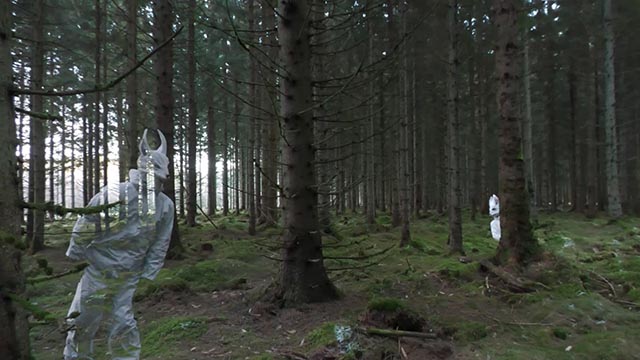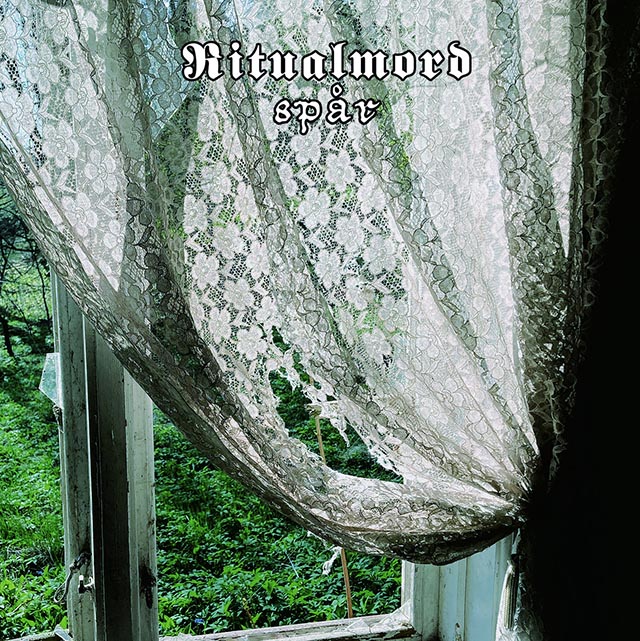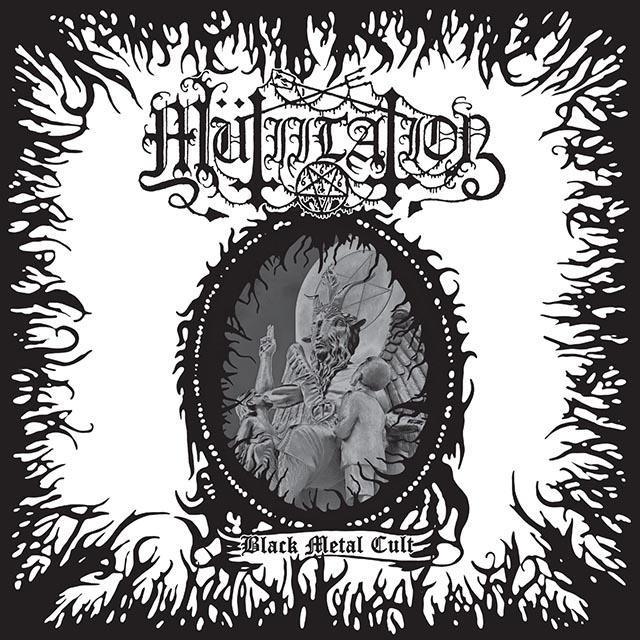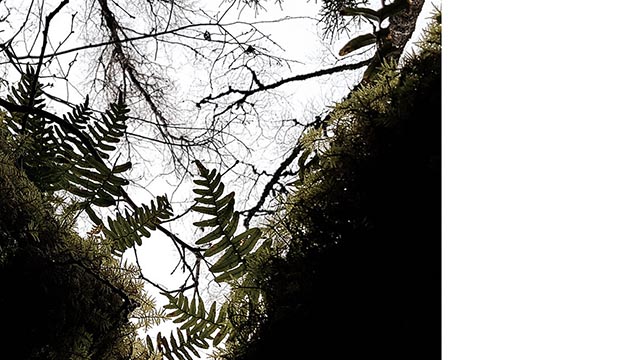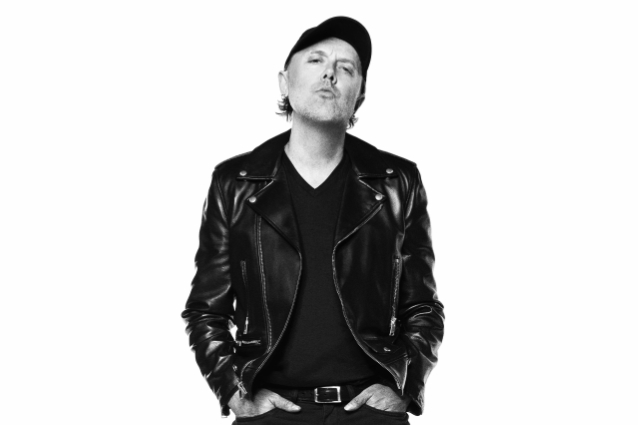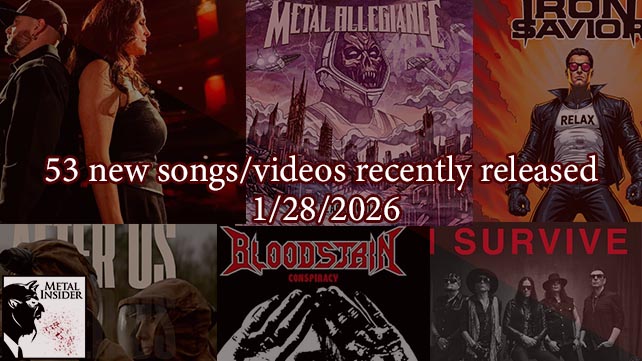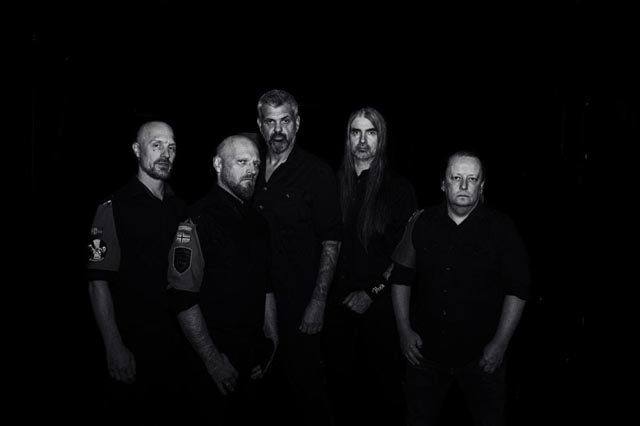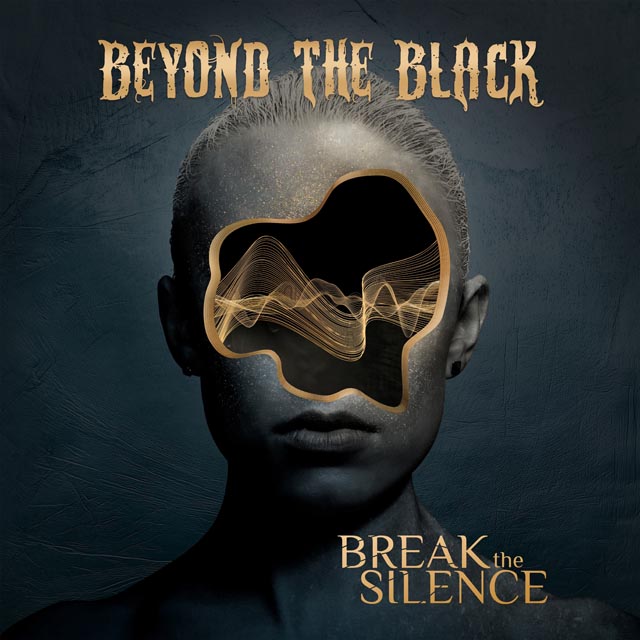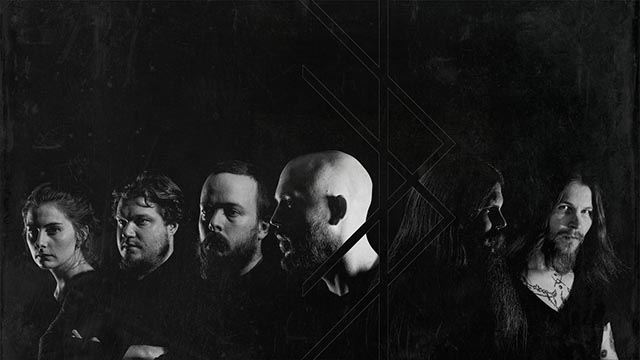
Guest Interview by Jillian Drachman
The legendary Kim Carlsson is revered as the frontman of the powerhouse that was Lifelover. Under the moniker “( ),” Carlsson formed this pioneering outfit with Jonas Lars “B” Bergqvist in 2005. After Bergqvist’s tragic death, which signified the end of Lifelover, Carlsson co-founded the extraordinarily individualistic entity Kall. Carlsson actually considers Hypothermia, conceived in 2001, to be his main band. He has several other phenomenal projects, such as Consider Suicide, A Symphony to the Void, Horns Emerging, and Ritualmord. Many remember the brilliant duo Life Is Pain, which included the fabled Trist. Although Carlsson has inspired countless black metal artists, his music transcends categories. He is constantly exploring new creative horizons and has, of course, produced a varied body of brilliant work. Kim considers nature to be his greatest muse. On his YouTube channel, Vemodsorkestern, Carlsson stated: “I’ve always heard music in nature. To me, the best way to get into something is to have complete or… [near] silence. That’s when I truly hear the music that the world has to offer me.” Without further ado, please enjoy the conversation that follows with the master himself. We touched upon Kall, Hypothermia, Lifelover, Carlsson’s magnificent visual art, and more.
Obviously, Kall is a very different entity from Lifelover, even though it involves some of the same members. Lifelover represented your shared vision with Jonas, or “B,” and that will prove immortal. Do your bandmates in Kall have a greater role than in Lifelover?
The other composers in Kall were never composing members of Lifelover, but now they can be a reflection of themselves and their own values. That’s what makes Kall special and different from Lifelover. It’s still the same people but a different vision, a different perspective. That’s why, after so many years, it’s still a worthwhile pursuit — we’re coming from the same place, but we’re looking at it from a different view.
I’m very much looking forward to your next album with Kall, which will, of course, be coming out via Prophecy Productions. In my eyes, it would be impossible to beat Brand [2020], your previous album. It’s beyond powerful and radically inventive. So, it will be interesting to see where you go from there.
I think it’s important to just show that you’re evolving, and that you have different kinds of songs. So, this is going to be a bit less introspective and a bit maybe more live-friendly, less jam oriented, a bit less experimental, but also more experimental. It’s hard to explain. I’ve been collecting instruments and effects for many years, so I’ll use some space on this record to show some weird things. And, yeah, it’s going to be different. It’s not supposed to be like: “Ah, this is going to beat Brand.” It’s going to be a natural evolution that shows people, just like we did in Lifelover, that we’re telling a story with each album and showing how we progress and evolve as musicians and individuals. We have great plans for the fourth album and hopefully an EP in between and maybe some collaborations coming up too. We want to at least show that, yeah, it’s not going to take 5 or 10 years until the next album. We’re just going to keep going. It’s not about surpassing ourselves but keeping active and, yeah, continuing to be artists instead of being too focused on the details because then you can easily drown in it and nothing happens.
Yes, again, I don’t think you can surpass yourselves. How do you surpass genius?! So, do you write all of Kall’s lyrics?
No, unfortunately. To me, writing lyrics is a very long process that is connected to both wandering many hours and a lot of meditation. Since there are other members than me in the band, it’s important for them to feel a connection to the songs or the themes in the songs too. And if it’s too personal to me and not to them, of course, it doesn’t make sense to have it. If they feel no connection to what I’m talking about, it becomes strange. That’s why Fix, one of our guitarists, is writing some lyrics for our next album. For Brand, he wrote both “Rise” and “Eld.” He came up with the concept for Brand’s cover art as well. Phil A. Cirone is writing some lyrics too. He’s really good at writing.
Is it more difficult for you to work with others’ lyrics than your own?
I think so because it takes a lot of effort to get into the right kind of mood and emotion. I think it’s a very personal thing to write lyrics for songs and decide how you want them to be connected to the music. Fortunately, I’ve known these people since they were kids. I’ve known them for over twenty years now. I’ve seen them grow up and start their own families and stuff. So, it’s really strange, but it’s life, you know. And, yeah, when I read something they’ve made, or when I hear their music, I know how to connect it and make it work. That’s why some of our songs might not even have lyrics but just a theme or a mantra and a title. I will try to make it sound or feel good or interesting because it’s dangerous to be dependent on this idea of what a song is. We are the band. We decide what our songs are, and we decide what the lyrics are.
In conversation with Din Întunerec, you stated: “My goal is to change the definition of genres, which is only possible by creating our own.” Of course, I really appreciate how you’ve forged new styles and always acted as a pioneer. For a lot of people these days, it’s too difficult to try to grasp something new…
And not just search for how it fits into black metal or post-rock. They want it to be defined, but it’s not the definition that matters. It’s the mood and atmosphere. Even if I make an acoustic album, it’s going to be more black metal than most people record nowadays because the emotion will be there. That’s why I started making fewer black metal productions over the years. I wanted to show people that you can approach darkness in so many different ways. That’s also why I’m, over the years, coming back to a more old-school kind of production to show people that, yeah, you can do both. One doesn’t exclude the other. That’s really important. I’ve been thinking a lot over the years, and it’s not stopping. I have a lot of things to show and share and tell, and I’m looking forward to what the next year has in store.
I’m really excited as well. I understand that you don’t really listen to new music. Is that still the case?
Yeah, I rarely listen to new music because I’m busy making my own, but I pay attention to people I know. I really love seeing the musicians and artists I know evolve and grow. That’s one of the best gifts in life, I think — to see talented people becoming more talented and also getting recognition. That makes me forget about all the — “poser” is the wrong word — but all the mediocre bullshit. Sure, that’s always going to be there no matter what work you’re in, but, in the end, that doesn’t matter because that’s just noise in the background. The thing that’s important is what, in the end, gets the real attention and survives all the noise. That’s the true talent — bands like Hypothermia…
And all of your other projects! Obviously, you and your fellow legend, Shining’s Niklas Kvarforth, have had some interesting times together. Have you ever thought about collaborating with Shining?
Yeah, one time we had a joke about making a split with Shining and Lifelover because fans would obviously like that, but it would have been with a twinkle in the eye. Then, of course, Lifelover ended, so it didn’t happen.
Unlike you and Niklas, there are some “artists” who seem to believe that black metal is a hobby, and that really disgusts me! May I please have your thoughts?
Yeah, it’s terrible, and that’s also one of the reasons why I feel that I have to return. My friends’ most recent album was exactly about that. One funny thing is that they said in their release statement for that album that, yeah, of course, they are there to bring back the aggression and the violence in black metal. And the true values! I was planning to make a speech like that before my concerts with Hypothermia the same year, and then my drummer quit. But that’s one of the things that I wanted to share and prove to people. Yeah, I’m so tired of all the mediocre bands being rewarded for just being there. It’s the participation trophy kind of thing but in metal. If you’re not good at it, you shouldn’t be rewarded for just showing up. The entrance should be more than just buying a guitar. You have to do more.
Definitely, and, as you just said, this is part of why your art is so important. It reminds people what excellence sounds like and will hopefully steer their attention away from all of the clone bands. On a different note, it’s my understanding that your mom has actually been very supportive of your work. Is this true?
Yeah, she has always been a fan of Hypothermia and Lifelover. When she heard Lifelover and Hypothermia for the first time, she knew that they arose because she comes from a background of appreciating art like my grandfather. He used to like to collect classical music on vinyl. That’s what she grew up listening to. In the living room, there would be church organ music. That’s the kind of mentality I have when it comes to my music too. What I hear is classical music. It sounds like black metal to other people, but what I hear is folk music and classical music. It’s just interpreted in different ways and performed on other instruments. But if I had the ability to perform this on an organ, I would. That’s also not excluded in the future. I have relatives that play organs in churches, and they will collaborate with me in the future. My mother used to own a big farm with a mill in the past, and that’s where we had a festival every year for a decade. We would premiere Lifelover and Hypothermia records before anyone else heard them, just for the visitors of that festival. The shame was that the festival will never get the recognition it deserved. We would only have like 20 or 30 people come every year. How many festivals are in the band’s own backyard, and you get to hang out with the band, they will cook for you, you will hang out with their mother and their family, and things like that?!
That sounds amazing! But weren’t there reporters and photographers there to capture everything and spread awareness?!
A bit. We had people take some photographs and some videos. It never became something bigger. Then we had to stop because we had to move and stuff like that. But that’s just how things evolve over the years.
Of course, you’re an exhibited artist. Your visual art is obviously stunning. You’ve spoken about the fact that your mother is a painter. Did she teach you how to paint?
Yes and no, because I’m bad at taking directions. She told me how to blend colors, and that’s one of the most important parts. If you don’t know that, it’s really hard to get a feeling of how to make one layer into a second layer. Again, she’s been one of the old-school supporters of all of my work. She doesn’t impose anything upon me and say: “Yeah, you should do this or that to make a painting.” I didn’t really think about how I used blood in my paintings because it was first a ritual that was just a part of my meditations. Then when I started experimenting with psychedelia — LSD, mushrooms, and other things like that, I connected everything in my head that I had forgotten about or refused to learn when I was in school because I wasn’t interested in how the school presented these systems to me. But when I got to learn them again on my own terms or through nature’s terms, then something clicked, and I understood that everything is physics and chemistry. That’s connected to my other profession as a chef cooking food and making things work. Something is either fat or acid, and what you mix in it affects how it will look on paper. For example, if you put wine and blood together, that makes the pigments crack the same as if you have ink and put something acidic in like wine. You get a marble effect.
When exactly did you start using your blood as an ingredient for your paintings?
I think that was pretty early in my teenage years. I never cut myself because I felt sorry for myself or to get attention. To me, it was just meditation and a discipline tool. If I felt that I made a mistake, and if that mistake was connected to me having pain or feeling bad, I would probably make that mistake less often. So, I started cutting myself to teach myself how to amplify different moods for recordings, especially for Hypothermia in the past. If I’m bleeding, it creates a different feeling to perform a song compared to just sitting on a chair playing guitar, and the same is for painting. In many cases, I had no money, and buying paint or ink is expensive. But I can create my own ink. I can create my own paint. I’m my own paint shop. So, that realization was a bit silly but also funny: “Yeah, if I just take this sharp object and hit it on my leg, I can make as much paint as I want.” So, I just have to worry about buying papers.
I know that this is a hard topic and that the answer is still probably “no,” but do you have any plans to do anything Lifelover-related?
We had some thoughts about it in the past, but the problem is that everyone who was involved in the 10-year anniversary has gone on to do other things with their lives that are a priority for them. If we restarted all of that again, it would take like five years away from any attention that we need to give both Kall and Hypothermia. That’s not something that we’re prepared to or willing to do anymore. So, unfortunately, we all have to be okay with the 10-year anniversary being the final end to that chapter in our lives. Even the same month that Jonas died, we had a lot of interesting offers. We were confirmed for all the big metal festivals in Europe. We were supposed to play at both Wacken and Hellfest. And all of that disappeared in just one day. That’s just how it is, unfortunately. If we are supposed to gain the same success in the future with Kall, that will prove itself. But, yeah, Lifelover will not be anything anymore. The only thing that I can do, since I’m the co-founder, is sometimes talk to the label owners of Prophecy and Osmose because they are the people who own the rights to the back catalog of Lifelover. We find interesting ways to reissue the old recordings and make new shirts and things like that without feeling like it’s just using the brand or logo. At least, we can offer the people that love the band proper editions that are high quality. As long as we can do that, I think we’re doing the legacy justice. Part of being eternal means that no matter who dies or survives, there is someone left to keep doing the work.
Exactly! I think the 2015 concerts were a beautiful way to end things. As I started off by saying, people are obviously always going to remember Lifelover. In my opinion, it was one of the very best and most emotionally impactful bands — one of the few that can prove life-changing.
Guest Interview by Jillian Drachman

